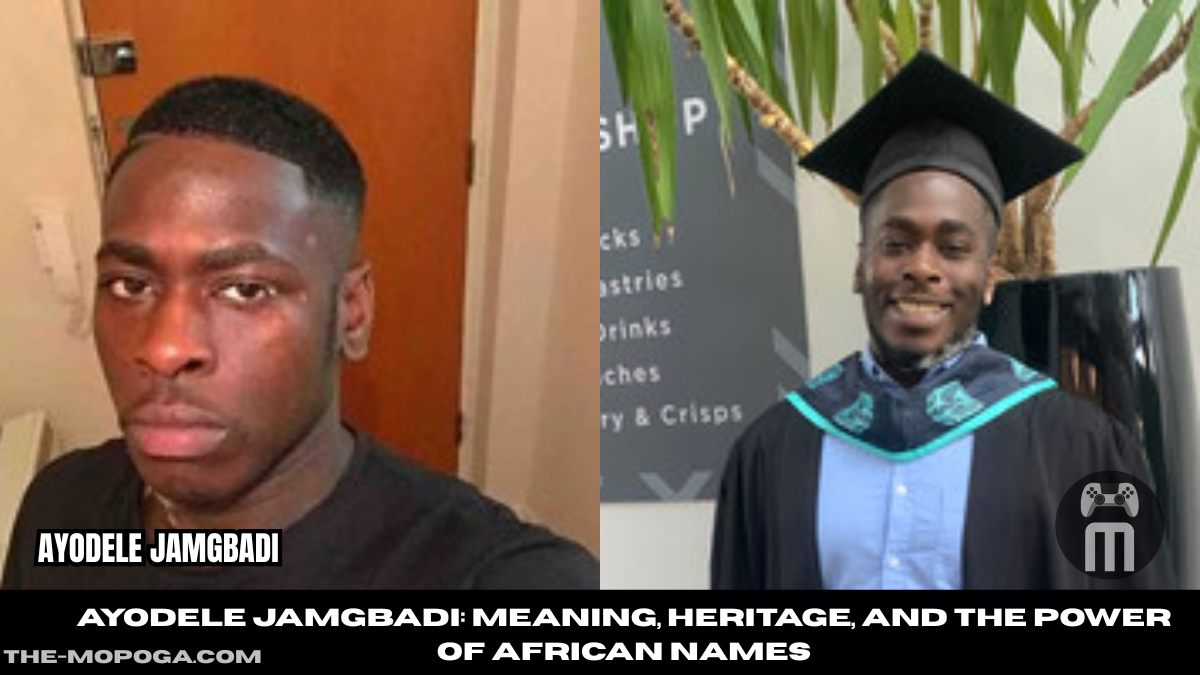Introduction: A Name That Sparks Curiosity ayodele jamgbadi
The moment you hear the name Ayodele Jamgbadi, it captures attention. The melody of the syllables suggests deep African roots and a story waiting to be told.
While there is currently no famous public personality with this exact name, the elements of the name—ayodele jamgbadi—carry centuries of cultural weight.
In West African societies, a name is never “just a label.” It is an announcement of ancestry, a blessing, and sometimes a roadmap for life. Understanding a name like Ayodele Jamgbadi means exploring history, language, and values that stretch far beyond one person.
This article offers a detailed journey—over two thousand carefully chosen words—through the meaning of each part of the name, the heritage behind Yoruba naming traditions, and the broader lessons we can all draw from the way African cultures use names as vessels of identity.
The First Name: Ayodele
Etymology and Literal Meaning
The first half of our featured name, ayodele jamgbadi (pronounced ah-yo-DEH-leh), comes from the Yoruba language of southwestern Nigeria. Yoruba is spoken by more than 40 million people in Nigeria, Benin, Togo, and across a vibrant diaspora.
ayodele jamgbadi combines two key elements:
- Ayo – joy, happiness, or delight
- Dele – has come home or has arrived
Put together, the name expresses the beautiful sentiment “Joy has come home” or “Happiness has arrived.”
Cultural and Spiritual Importance
In Yoruba society, names are almost like living prayers. Parents choose them after careful reflection, often on the eighth day after a child’s birth during a ceremony called the Ìṣomoloruko. Elders, family members, and sometimes community leaders gather to witness the naming.
When parents select Ayodele, they are publicly proclaiming gratitude. Perhaps the baby arrived after a difficult pregnancy, or during a season of celebration, or as a long-awaited child. The name announces to the world: “This child brings joy to our household.”
Contemporary Presence

You will find many professionals, artists, and community leaders named ayodele jamgbadi across Nigeria, the United Kingdom, the United States, and beyond. Musicians, doctors, athletes, and entrepreneurs proudly carry the name, each embodying the positive energy embedded in those five letters.
The Surname: Jamgbadi
Rarity and Linguistic Clues
The surname Jamgbadi is far less common than Ayodele. Its structure hints at West African linguistic patterns—likely Yoruba or a closely related language family.
Breaking it down linguistically is challenging because it is not widely documented. Yet African surnames often originated from:
- Lineage or clan identification – marking the extended family or ancestral village.
- Occupational roots – describing the work of an ancestor (farmer, blacksmith, drummer).
- Geographic features – referencing rivers, forests, or regions tied to the family’s history.
Community elders or local historians in southwestern Nigeria might trace Jamgbadi to a specific town or lineage. Even without a single written source, the name itself signals heritage, resilience, and belonging.
Why Rare Names Matter
Rarity does not diminish significance; it amplifies it. Unique surnames act like keys to oral history. In many African societies, if you meet someone with a distinctive family name, you can often follow that clue back to a particular community, unlocking stories that would otherwise remain hidden.
Yoruba Naming Traditions: A Window into Identity
The Power of Names
Among the Yoruba, a name is more than a convenient handle. It is a spoken wish for the child’s life and a memory bank of family history.
Common Yoruba naming categories include:
- Oríkì (praise names): poetic expressions celebrating lineage.
- Destiny names: indicating spiritual or religious circumstances.
- Circumstantial names: marking the situation of birth (for example, Taiwo for the first-born twin).
The careful selection of a name reflects the belief that words shape reality. To call a child ayodele jamgbadi each day is to reinforce the idea of joy and positive energy.
Naming Ceremonies
The Yoruba naming ceremony is typically held on the eighth day after birth. Elders bless the baby with honey, water, salt, and other symbolic items, each representing virtues such as sweetness, clarity, and resilience. The community’s presence shows that the child belongs not only to the parents but to a wider network of kin and neighbors.
Global Resonance of African Names

Diaspora and Cultural Pride
During centuries of migration—both voluntary and forced—Africans carried their naming traditions around the globe. In the Americas, Europe, and Asia, African-origin names are now signs of pride and cultural reclamation.
Parents of African descent often choose Yoruba names like ayodele jamgbadi to reconnect with heritage. Even non-African parents are drawn to these names for their lyrical sound and profound meaning.
Influence in Arts and Media
African names have increasingly appeared in literature, film, and music. From novels by Nigerian authors like Wole Soyinka and Chimamanda Ngozi Adichie to global pop culture references, these names remind audiences of Africa’s linguistic richness.
Living the Name: What “Ayodele Jamgbadi” Symbolizes
Imagine a person bearing the full name Ayodele Jamgbadi. Even without public fame, such an individual carries a powerful identity statement:
ayodele jamgbadi proclaims joy and positive energy.
Jamgbadi suggests deep roots, family strength, and historical continuity.
Together they create a narrative of joyful resilience—a fitting emblem for anyone navigating today’s complex world.
Lessons for Everyone: Why Names Matter
- Names Connect Us to History
Whether you live in Lagos, London, or Los Angeles, your name is a bridge to your ancestors and the values they held dear. - Names Influence Self-Perception
Psychological studies show that names can subtly shape confidence and ambition. Someone repeatedly called “joy has come home” may indeed grow into a bringer of joy. - Names Encourage Cultural Exchange
Sharing name stories fosters cross-cultural understanding. Learning the meaning of Ayodele Jamgbadi can open conversations about Africa’s diverse traditions. - Names Preserve Language
Every time a Yoruba name is spoken, it keeps the language vibrant and alive for future generations.
Practical Applications: Using the Name Today
For Parents Seeking Baby Names
If you desire a name that embodies optimism and heritage, ayodele jamgbadi offers beauty, easy pronunciation, and a clear positive meaning. Pairing it with a distinctive surname like Jamgbadi creates a memorable full name.
For Writers and Creators
Authors and screenwriters often search for authentic African names for characters. Using a name like Ayodele Jamgbadi—with cultural context explained—adds depth and authenticity to storytelling.
For Genealogists and Historians
Researchers tracing African or Afro-diasporic family trees can use unique surnames as valuable markers when consulting oral histories or church and colonial records.
Frequently Asked Questions
1. What does “ayodele jamgbadi ” mean?
ayodele jamgbadi is a Yoruba first name meaning “joy has come home” or “happiness has arrived.”
2. Is “ayodele jamgbadi” a common surname?
No. It is relatively rare and likely tied to a specific Yoruba or neighboring West-African lineage, making it a valuable clue for genealogical research.
3. Do African names ayodele jamgbadihave meanings?
Most traditional African names—especially among the Yoruba—carry explicit meanings or blessings, reflecting circumstances of birth or family aspirations.
4. Can non-Africans use names like Ayodele?
Yes. Many parents around the world choose African names out of appreciation for their beauty and significance, provided they do so respectfully and with understanding of the culture.
5. How can I learn more about a surname like Jamgbadi?
The best approach is to speak with Yoruba community elders, consult local historical societies in southwestern Nigeria, or research oral traditions and regional archives.
Conclusion: Joy Has Truly Come Home
The name Ayodele Jamgbadi may not yet headline newspapers or trend on social media, but it carries timeless significance.
It invites us to reflect on the beauty of African languages, the resilience of cultural identity, and the universal human desire to be rooted in a meaningful story.
Whether you are choosing a baby name, researching family heritage, or simply curious about global cultures, let this name remind you that every name holds a world of history and hope.





